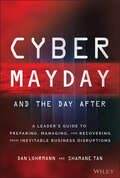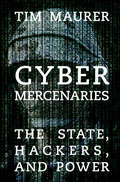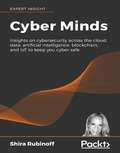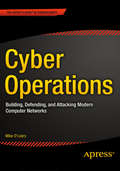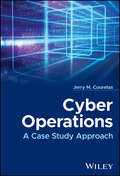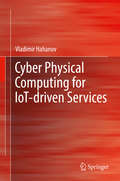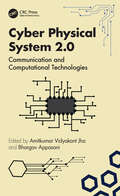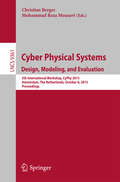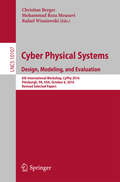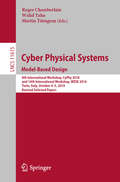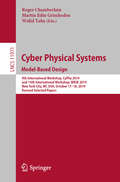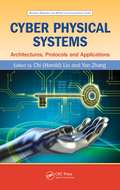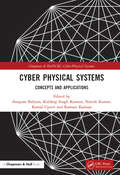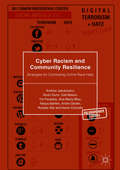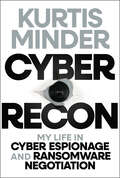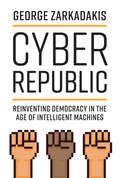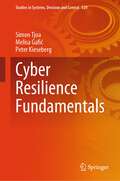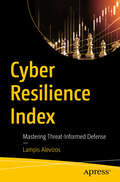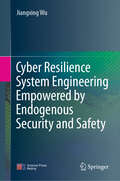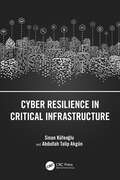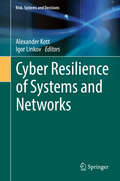- Table View
- List View
Cyber Justice: Human Rights and Good Governance for the Internet (SpringerBriefs in Political Science)
by Anja MihrThis book introduces Cyber Justice as a viable approach for promoting good governance based on human rights norms in the internet. The author defines cyberspace as a borderless public space without common rules or government control mechanisms that protect and foster people's activities within that space. In light of the growing scope of communications and interactions in the internet, the author shows how human rights and governance regimes can be adapted to cyberspace in order to ensure more accountability, transparency and interaction among those who use the internet and those who manage and provide internet services. This book will be of interest for scholars and policymakers interested in establishing governance regimes for cyberspace that will enjoy the support and trust of all users.
Cyber Kids, Cyber Bullying, Cyber Balance
by Constance Hanel Barbara C. TrolleyEmphasizing prevention, assessment, and evaluation, this proactive guide shows how to advance learning, reduce cyber bullying, and improve school climate by helping students use technology responsibly.
Cyber Law: Maximizing Safety and Minimizing Risk in Classrooms
by Aimee M. BissonetteAn essential overview of legal issues related to technology, this resource provides case summaries and proactive strategies on privacy, security, copyright, appropriate online behavior, and more.
Cyber Malware: Offensive and Defensive Systems (Security Informatics and Law Enforcement)
by Leandros A. Maglaras Iman Almomani Mohamed Amine Ferrag Nick AyresThis book provides the foundational aspects of malware attack vectors and appropriate defense mechanisms against malware. The book equips readers with the necessary knowledge and techniques to successfully lower the risk against emergent malware attacks. Topics cover protections against malware using machine learning algorithms, Blockchain and AI technologies, smart AI-based applications, automated detection-based AI tools, forensics tools, and much more. The authors discuss theoretical, technical, and practical issues related to cyber malware attacks and defense, making it ideal reading material for students, researchers, and developers.
Cyber Mayday and the Day After: A Leader's Guide to Preparing, Managing, and Recovering from Inevitable Business Disruptions
by Daniel Lohrmann Shamane TanSuccessfully lead your company through the worst crises with this first-hand look at emergency leadership Cyber security failures made for splashy headlines in recent years, giving us some of the most spectacular stories of the year. From the Solar Winds hack to the Colonial Pipeline ransomware event, these incidents highlighted the centrality of competent crisis leadership. Cyber Mayday and the Day After offers readers a roadmap to leading organizations through dramatic emergencies by mining the wisdom of C-level executives from around the globe. It’s loaded with interviews with managers and leaders who've been through the crucible and survived to tell the tale. From former FBI agents to Chief Information Security Officers, these leaders led their companies and agencies through the worst of times and share their hands-on wisdom. In this book, you’ll find out: What leaders wish they'd known before an emergency and how they've created a crisis game plan for future situations How executive-level media responses can maintain – or shatter – consumer and public trust in your firm How to use communication, coordination, teamwork, and partnerships with vendors and law enforcement to implement your crisis response Cyber Mayday and the Day After is a must-read experience that offers managers, executives, and other current or aspiring leaders a first-hand look at how to lead others through rapidly evolving crises.
Cyber Mercenaries: The State, Hackers, and Power
by Tim MaurerCyber Mercenaries explores the secretive relationships between states and hackers. As cyberspace has emerged as the new frontier for geopolitics, states have become entrepreneurial in their sponsorship, deployment, and exploitation of hackers as proxies to project power. Such modern-day mercenaries and privateers can impose significant harm undermining global security, stability, and human rights. These state-hacker relationships therefore raise important questions about the control, authority, and use of offensive cyber capabilities. While different countries pursue different models for their proxy relationships, they face the common challenge of balancing the benefits of these relationships with their costs and the potential risks of escalation. This book examines case studies in the United States, Iran, Syria, Russia, and China for the purpose of establishing a framework to better understand and manage the impact and risks of cyber proxies on global politics.
Cyber Minds: Insights on cybersecurity across the cloud, data, artificial intelligence, blockchain, and IoT to keep you cyber safe
by Shira RubinoffCyber Minds brings together an unrivalled panel of international experts who offer their insights into current cybersecurity issues in the military, business, and government. Key Features Explore the latest developments in cybersecurity Hear expert insight from the industry's top practitioners Dive deep into cyber threats in business, government, and military Book Description Shira Rubinoff's Cyber Minds brings together the top authorities in cybersecurity to discuss the emergent threats that face industries, societies, militaries, and governments today. With new technology threats, rising international tensions, and state-sponsored cyber attacks, cybersecurity is more important than ever. Cyber Minds serves as a strategic briefing on cybersecurity and data safety, collecting expert insights from sector security leaders, including: General Gregory Touhill, former Federal Chief Information Security Officer of the United States Kevin L. Jackson, CEO and Founder, GovCloud Mark Lynd, Digital Business Leader, NETSYNC Joseph Steinberg, Internet Security advisor and thought leader Jim Reavis, Co-Founder and CEO, Cloud Security Alliance Dr. Tom Kellerman, Chief Cybersecurity Officer for Carbon Black Inc and Vice Chair of Strategic Cyber Ventures Board Mary Ann Davidson, Chief Security Officer, Oracle Dr. Sally Eaves, Emergent Technology CTO, Global Strategy Advisor – Blockchain AI FinTech, Social Impact award winner, keynote speaker and author Dr. Guenther Dobrauz, Partner with PwC in Zurich and Leader of PwC Legal Switzerland Barmak Meftah, President, AT&T Cybersecurity Cleve Adams, CEO, Site 1001 (AI and big data based smart building company) Ann Johnson, Corporate Vice President – Cybersecurity Solutions Group, Microsoft Barbara Humpton, CEO, Siemens USA Businesses and states depend on effective cybersecurity. This book will help you to arm and inform yourself on what you need to know to keep your business – or your country – safe. What you will learn The threats and opportunities presented by AI How to mitigate social engineering and other human threats Developing cybersecurity strategies for the cloud Major data breaches, their causes, consequences, and key takeaways Blockchain applications for cybersecurity Implications of IoT and how to secure IoT services The role of security in cyberterrorism and state-sponsored cyber attacks Who this book is for This book is essential reading for business leaders, the C-Suite, board members, IT decision makers within an organization, and anyone with a responsibility for cybersecurity.
Cyber Operations
by Mike O'LearyCyber Operations walks you through all the processes to set up, defend, and attack computer networks. This book focuses on networks and real attacks, offers extensive coverage of offensive and defensive techniques, and is supported by a rich collection of exercises and resources.You'll learn how to configure your network from the ground up, starting by setting up your virtual test environment with basics like DNS and active directory, through common network services, and ending with complex web applications involving web servers and backend databases.Key defensive techniques are integrated throughout the exposition. You will develop situational awareness of your network and will build a complete defensive infrastructure—including log servers, network firewalls, web application firewalls, and intrusion detection systems.Of course, you cannot truly understand how to defend a network if you do not know how to attack it, so you will attack your test systems in a variety of ways beginning with elementary attacks against browsers and culminating with a case study of the compromise of a defended e-commerce site.The author, who has coached his university’s cyber defense team three times to the finals of the National Collegiate Cyber Defense Competition, provides a practical, hands-on approach to cyber security.
Cyber Operations: A Case Study Approach
by Jerry M. CouretasCyber Operations A rigorous new framework for understanding the world of the future Information technology is evolving at a truly revolutionary pace, creating with every passing year a more connected world with an ever-expanding digital footprint. Cyber technologies like voice-activated search, automated transport, and the Internet of Things are only broadening the interface between the personal and the online, which creates new challenges and new opportunities. Improving both user security and quality of life demands a rigorous, farsighted approach to cyber operations. Cyber Operations offers a groundbreaking contribution to this effort, departing from earlier works to offer a comprehensive, structured framework for analyzing cyber systems and their interactions. Drawing on operational examples and real-world case studies, it promises to provide both cyber security professionals and cyber technologies designers with the conceptual models and practical methodologies they need to succeed. Cyber Operations readers will also find: Detailed discussions of case studies including the 2016 United States Presidential Election, the Dragonfly Campaign, and more Coverage of cyber attack impacts ranging from the psychological to attacks on physical infrastructure Insight from an author with top-level experience in cyber security Cyber Operations is ideal for all technological professionals or policymakers looking to develop their understanding of cyber issues.
Cyber Physical Computing for IoT-driven Services
by Vladimir HahanovThis book presents the cyber culture of micro, macro, cosmological, and virtual computing. The book shows how these work to formulate, explain, and predict the current processes and phenomena monitoring and controlling technology in the physical and virtual space. The authors posit a basic proposal to transform description of the function truth table and structure adjacency matrix to a qubit vector that focuses on memory-driven computing based on logic parallel operations performance. The authors offer a metric for the measurement of processes and phenomena in a cyberspace, and also the architecture of logic associative computing for decision-making and big data analysis. The book outlines an innovative theory and practice of design, test, simulation, and diagnosis of digital systems based on the use of a qubit coverage-vector to describe the functional components and structures. Authors provide a description of the technology for SoC HDL-model diagnosis, based on Test Assertion Blocks Activated Graph. Examples of cyber-physical systems for digital monitoring and cloud management of social objects and transport are proposed. A presented automaton model of cosmological computing explains the cyclical and harmonious evolution of matter-energy essence, and also a space-time form of the Universe.
Cyber Physical System 2.0: Communication and Computational Technologies
by Bhargav Appasani Amitkumar Vidyakant JhaThe book covers the emerging communication and computational technologies for future cyber-physical systems and discusses the security of in-vehicle communication protocols using automotive embedded systems, presenting an in-depth analysis across various domains, such as manufacturing, transportation, health-care, and smart cities.This book: Discusses how communication and computing co-design provides dynamic adaptability and centralized control. Presents the convergence of physical and digital realities within the metaverse and multiverse, setting the stage for the future of cyber-physical-social systems (CPSS). Presents emerging communication and computational technologies, such as 6G, software-defined networking, cloud computing, blockchain, artificial intelligence, machine learning, virtual reality, and blockchain, for the design and implementation of cyber-physical systems. Explores advanced topics such as security and privacy in industrial CPS, strategies for protecting serial industrial networks, and enhancing firmware update security in automotive systems. It is primarily written for senior undergraduates, graduate students, and academic researchers in the fields of electrical engineering, electronics and communication engineering, computer science and engineering, and information technology.
Cyber Physical Systems. Design, Modeling, and Evaluation: 5th International Workshop, CyPhy 2015, Amsterdam, The Netherlands, October 8, 2015, Proceedings (Lecture Notes in Computer Science #9361)
by Mohammad Reza Mousavi Christian BergerThis book constitutes the proceedings of the 5th International Workshop on Design, Modeling, and Evaluation of Cyber Physical Systems, CyPhy 2015, held as part of ESWeek 2015, in Amsterdam, The Netherlands, in October 2015. The 10 papers presented in this volume were carefully reviewed and selected from 13 submissions. They broadly interpret, from a diverse set of disciplines, the modeling, simulation, and evaluation of cyber-physical systems.
Cyber Physical Systems. Design, Modeling, and Evaluation: 6th International Workshop, CyPhy 2016, Pittsburgh, PA, USA, October 6, 2016, Revised Selected Papers (Lecture Notes in Computer Science #10107)
by Mohammad Reza Mousavi Christian Berger Rafael WisniewskiThis book constitutes the proceedings of the 5th International Workshop on Design, Modeling, and Evaluation of Cyber Physical Systems, CyPhy 2015, held as part of ESWeek 2015, in Amsterdam, The Netherlands, in October 2015. The 10 papers presented in this volume were carefully reviewed and selected from 13 submissions. They broadly interpret, from a diverse set of disciplines, the modeling, simulation, and evaluation of cyber-physical systems.
Cyber Physical Systems. Model-Based Design: 8th International Workshop, CyPhy 2018, and 14th International Workshop, WESE 2018, Turin, Italy, October 4–5, 2018, Revised Selected Papers (Lecture Notes in Computer Science #11615)
by Walid Taha Roger Chamberlain Martin TörngrenThis book constitutes the proceedings of the 8th International Workshop on Design, Modeling, and Evaluation of Cyber Physical Systems, CyPhy 2018 and 14th International Workshop on Embedded and Cyber-Physical Systems Education, WESE 2018, held in conjunction with ESWeek 2018, in Torino, Italy, in October 2018.The 13 full papers presented together with 1 short paper in this volume were carefully reviewed and selected from 18 submissions. The conference presents a wide range of domains including Modeling, simulation, verification, design, cyber-physical systems, embedded systems, real-time systems, safety, and reliability.
Cyber Physical Systems. Model-Based Design: 9th International Workshop, CyPhy 2019, and 15th International Workshop, WESE 2019, New York City, NY, USA, October 17-18, 2019, Revised Selected Papers (Lecture Notes in Computer Science #11971)
by Walid Taha Roger Chamberlain Martin Edin GrimhedenThis book constitutes the proceedings of the 9th International Workshop on Model-Based Design of Cyber Physical Systems, CyPhy 2019 and 15th International Workshop on Embedded and Cyber-Physical Systems Education, WESE 2019, held in conjunction with ESWeek 2019, in New York City, NY, USA, in October 2019.The 13 full papers presented together in this volume were carefully reviewed and selected from 24 submissions. The conference presents a wide range of domains including models and design; simulation and tools; formal methods; embedded and cyber-physical systems education.
Cyber Physical Systems: Architectures, Protocols and Applications
by Yan Zhang Chi Harold LiuCyber Physical Systems: Architectures, Protocols and Applications helps you understand the basic principles and key supporting standards of CPS. It analyzes different CPS applications from the bottom up, extracting the common characters that form a vertical structure. It presents mobile sensing platforms and their applications toward interrelated p
Cyber Physical Systems: Concepts and Applications (Chapman & Hall/CRC Cyber-Physical Systems)
by Anupam Baliyan, Kuldeep Singh Kaswan, Naresh Kumar, Kamal Upreti, and Ramani KannanCyber Physical System (CPS) is an integration of computation, networking, and physical processes: the combination of several systems ofdifferent nature whose main purpose is tocontrol a physical process and, through feedback, adapt itself to new conditions, in real time.Cyber Physical System: Concepts and Applications includes an in-depth coverage of the latestmodels and theories that unify perspectives. It expresses the interacting dynamics of the computational and physical components of asystem in a dynamic environment. Covers automatic application of software countermeasures against physical attacks and impact of cyber physical system on industry 4.0 Explains how formal models provide mathematical abstractions to manage the complexity of a system design Offers a rigorous and comprehensive introduction to the principles of design,specification, modelling, and analysis of cyber physicalsystems Discusses the multiple domains where Cyber Physical system has a vital impact and provides knowledge about different models thatprovide mathematical abstractions tomanage the complexity of a system design Provides the rapidly expanding field of cyber-physical systems with a Long-needed foundational text by an established authority This book is primarily aimed at advanced undergraduates, graduates of computer science. Engineers will also find this book useful.
Cyber Racism and Community Resilience: Strategies for Combating Online Race Hate (Palgrave Hate Studies)
by Karen Connelly Andrew Jakubowicz Kevin Dunn Gail Mason Yin Paradies Ana-Maria Bliuc Nasya Bahfen Andre Oboler Rosalie AtieThis book highlights cyber racism as an ever growing contemporary phenomenon. Its scope and impact reveals how the internet has escaped national governments, while its expansion is fuelling the spread of non-state actors. In response, the authors address the central question of this topic: What is to be done? Cyber Racism and Community Resilience demonstrates how the social sciences can be marshalled to delineate, comprehend and address the issues raised by a global epidemic of hateful acts against race. Authored by an inter-disciplinary team of researchers based in Australia, this book presents original data that reflects upon the lived, complex and often painful reality of race relations on the internet. It engages with the various ways, from the regulatory to the role of social activist, which can be deployed to minimise the harm often felt. This book will be of particular interest to students and academics in the fields of cybercrime, media sociology and cyber racism.
Cyber Recon: My Life in Cyber Espionage and Ransomware Negotiation
by Kurtis MinderAn up close and personal look at cyber espionage and digital spycraft In Cyber Recon: My Life in Cyber Espionage and Ransomware Negotiation, 30-year cybersecurity veteran Kurtis Minder delivers a fascinating exploration of real-world cyber espionage in some of the most dangerous places on the Internet. Through his experiences watching and hunting cybercriminals as varied as lone wolfs, the Russian mafia, and other official and unofficial nation-state hackers, he explains how cyber espionage is performed, the tools and skills that people like him use all the time, and the consequences of engaging with cybercriminals on a daily basis. Kurtis teaches you that the same operational security that keeps him and his team of spies safe will keep you and your organization's secrets safer too. And you'll explore whether fake personas on the internet are always bad or are there legitimate business uses for Romanian speaking sock puppets? You'll also discover critical lessons that Minder has learned as he's led his digital risk company, GroupSense, through many of the most dramatic incidents of online crime of the last few decades. Inside the book: Original profiles of cyber espionage and negotiation professionals so you're learning from Jax Scott, Jon DiMaggio, Jason Ingalls, Beau Woods, Brye Ravattine and many more, with QR-code links to extended YouTube interviews An original, non-technical primer on the people that populate the cyber risk landscape and the methods they use to carry out attacks Steps to avoid becoming a target of Lockbit, BlackMatter, NotPetya, and next year's most dangerous ransomware as well as how to minimize the business damage when you are a victim How the intersection of business negotiation and hostage negotiation relates to high-stakes ransomware negotiations The fast-moving transformation generative AI is unleashing in cyber attacks and defense An inside look at an endlessly interesting corner of the field of cybersecurity, Cyber Recon is also a must-read for anyone interested in spycraft, technology, hacking, or digital entrepreneurship.
Cyber Republic: Reinventing Democracy in the Age of Intelligent Machines
by George ZarkadakisScience and tech expert George Zarkadakis presents an indispensable guide to making liberal democracies more inclusive, and the digital economy more equitable in the coming Fourth Industrial Revolution.Around the world, liberal democracies are in crisis. Citizens have lost faith in their government; right-wing nationalist movements frame the political debate. At the same time, economic inequality is increasing dramatically; digital technologies have created a new class of super-rich entrepreneurs. Automation threatens to transform the free economy into a zero-sum game in which capital wins and labor loses. But is this digital dystopia inevitable? In Cyber Republic, George Zarkadakis presents an alternative, outlining a plan for using technology to make liberal democracies more inclusive and the digital economy more equitable. Cyber Republic is no less than a guide for the coming Fourth Industrial Revolution.
Cyber Resilience Fundamentals (Studies in Systems, Decision and Control #520)
by Peter Kieseberg Simon Tjoa Melisa GafićThis book provides readers with the necessary capabilities to meet the challenge of building and testing resilient IT services. Upon introducing the fundamentals of cyber resilience with important international standards and best practices, and the risk management process, the book covers in detail the cyber resilience management process. Here, it gives insights into the principles and design criteria to build cyber resilience in organizations, and to integrate it into operations to contribute to incident preparedness. Further, it describes measures for incident handling, including detection, containment, and post-incident handling, and analyses the most critical aspects of cyber resilience testing, such as auditing, exercising, and testing. Written for advanced undergraduate students attending information security and business continuity management courses, this book also addresses researchers and professionals in the broad field of IT Security and cyber resilience.
Cyber Resilience Index: Mastering Threat-Informed Defense
by Dr. Lampis AlevizosImagine quantifying and visualizing your organization's cyber resilience as precisely as a stock market index. This book introduces that reality through the innovative Cyber Resilience Index, a unified metric that helps master threat-informed defense, transform cybersecurity strategy, and achieve efficient and effective threat management and communication. Through an engaging dialogue between a seasoned CISO Sophia and an innovative security leader Alex, you are taken on a journey from traditional, reactive defense to a proactive, resilience-focused strategy. The book masterfully blends technical depth with strategic insights, explaining the paradigm shift from asset-driven to threat-intelligence-driven security. You will learn how and why compliance is very important, but not enough to be truly cyber resilient; how to construct and leverage interoperable cyber value chains; how to go beyond continuous threat exposure management programs and truly master the threat-informed defense concepts; how to articulate value, and manage your cyber defense through a unified metric (much like traders use stock market charts to make successful trading decisions); and, lastly, what the evolution of cybersecurity leadership looks like ahead. Whether you're a cybersecurity professional, a subject matter expert (SME), a business leader, a security leader, or an expert in the field looking for battle-tested ways to sharpen or develop your leadership skills, this book provides a new lens through which to view the future of cybersecurity and leadership. Are you ready to reshape the chessboard of cyber defense? What You Will Learn Quantify and visualize your organization's cyber resilience using a unified metric Transition from reactive defense to proactive, threat-informed strategy Build and optimize interoperable cyber value chains Articulate cybersecurity value to boards and executives Evolve beyond compliance-driven security to true cyber resilience Make data-driven cybersecurity decisions using the Cyber Resilience Index Anticipate and counter emerging cyber threats Transform your security operations into a well-oiled, efficient machine Engage in hands-on experience through practical exercises at the end of each chapter, laying groundwork for mastering threat-informed defense Develop essential soft skills for cybersecurity leaders, illustrated through philosophical quotes and real-world experiences Communicate strategies crucial for successful cybersecurity transformation Obtain leadership skills necessary to drive change in complex organizational environments Gain career development insights for SMEs aspiring to become the next generation of cybersecurity leaders Measure and manage defenses more efficiently than traditional risk management, and outdated risk matrices and risk registers Balance technical expertise with a strategic business mindset in cybersecurity leadership Strategize for what lies ahead in the development of the cyber resilience index, namely, integrating AI and machine learning towards the formation of an AI-driven cyber value chain Who This Book Is For CISOs and emerging leaders who want to sharpen their strategic edge; technical experts looking to grow into the leadership ladder; board members and executives who need to grasp cybersecurity at a strategic level; IT and security managers searching for fresh, data-driven and threat-informed approaches to fortify their defenses; and consultants who wish to gain cutting-edge insights to elevate their client offerings. Whether you're a veteran in the field, a curious academic, or a student of cybersecurity, this book provides a transformative view on the future of cyber defense, threat management, and cybersecurity leadership
Cyber Resilience System Engineering Empowered by Endogenous Security and Safety
by Jiangxing WuThis book reveals the essence of endogenous or internal contradictions in cyberspace security issues, systematically expounds the principle of cyberspace endogenous security and safety, introduces the author-invented dynamic heterogeneous redundant (DHR) architecture with endogenous security and safety features, and theoretically answers why DHR endogenous security and safety architecture can enable network resilience engineering; the enabling role of DHR architecture solves the problem that network resilience cannot cope with unknown damage, lacks structural gain, and cannot quantify design measures. This book analyses the systematic security gains that DHR architecture enabling network resilience engineering can bring in the four purpose dimensions of prevention, defense, recovery and adaptation; gives an application example of DHR endogenous security and safety architecture enabling network resilience engineering; introduces the research and exploration of endogenous security and safety theory in wireless communication security, artificial intelligence security and other derivative application fields; and uses rich application examples. It shows that the endogenous security and safety architecture enabling network resilience engineering not only is very necessary but also has universal application significance. This book is suitable for postgraduate teaching materials or reference books of related disciplines, such as cybersecurity, network resilience engineering, confidential computing/trusted computing, information physical systems/industrial control, etc.
Cyber Resilience in Critical Infrastructure
by Sinan Küfeoğlu Abdullah Talip AkgünCritical infrastructure sectors are those whose assets, systems, and networks, whether physical or virtual, are deemed so important to nations that their incapacitation or destruction would have a crippling effect on national security, national economic security, national public health or safety, or any combination of these. Each country might define their unique critical infrastructure. In this book, we compiled nine critical infrastructure sectors: Emergency Services, Energy, Finance, Food, Government, Health, Telecommunications, Transport, and Water. The continuity of services in these sectors is vital for the daily lives of societies and economies. This study introduces 49 case studies from various parts of the world. This book investigates Cyber Resilience in Critical Infrastructure by paying attention to recommending a national-level cyber resilience framework for all nations to use. Furthermore, we present sectoral analysis and case studies for each infrastructure by going through an in-depth analysis. As military tensions grow in many parts of the world, nations are alarmed and focused on their national cyber resilience, especially the reliability of their critical infrastructure. We believe this book will be a popular reference and guidebook for a wide range of readers worldwide, from governments to policymakers, from industry to the finance sector, and many others.
Cyber Resilience of Systems and Networks (Risk, Systems and Decisions)
by Alexander Kott Igor LinkovThis book introduces fundamental concepts of cyber resilience, drawing expertise from academia, industry, and government. Resilience is defined as the ability to recover from or easily adjust to shocks and stresses. Unlike the concept of security - which is often and incorrectly conflated with resilience -- resilience refers to the system's ability to recover or regenerate its performance after an unexpected impact produces a degradation in its performance. A clear understanding of distinction between security, risk and resilience is important for developing appropriate management of cyber threats. The book presents insightful discussion of the most current technical issues in cyber resilience, along with relevant methods and procedures. Practical aspects of current cyber resilience practices and techniques are described as they are now, and as they are likely to remain in the near term.The bulk of the material is presented in the book in a way that is easily accessible to non-specialists. Logical, consistent, and continuous discourse covering all key topics relevant to the field will be of use as teaching material as well as source of emerging scholarship in the field. A typical chapter provides introductory, tutorial-like material, detailed examples, in-depth elaboration of a selected technical approach, and a concise summary of key ideas.




